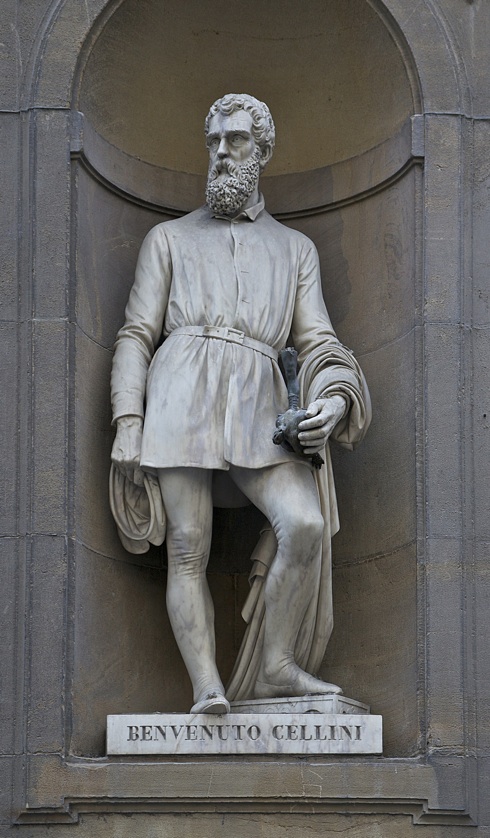Benvenuto Cellini was a Renaissance goldsmith who became a sculptor. He was also a boaster, a braggart, a duelist, and he dabbled in necromancy. His autobiography, written when he was fifty-eight, in 1558, is unfailingly entertaining. I read it years ago and I re-read it when I was visiting a friend in Florence recently, because I saw work of his and then found a copy of it in English with prints. It’s available for free online, and I suppose you could google up the illustrations. But it was the perfect book to be carrying around and reading in odd moments in Florence, which was Cellini’s city. (I also saw the actual handwritten manuscript, on display at the Uffizi.) It begins:
ALL men of whatsoever quality they be, who have done anything of excellence, or which may properly resemble excellence, ought, if they are persons of truth and honesty, to describe their life with their own hand; but they ought not to attempt so fine an enterprise till they have passed the age of forty.
Cellini thinks awfully well of himself, and he has some cause. He was a friend of Michaelangelo, he helped defend the Pope when France attacked Rome, he was sculptor to the king of France and to the first Medici Duke of Florence, and he lived in an age when everyone who has done anything excellent has a duty to write an autobiography.
Renaissance Florence isn’t an alien world, but it might as well be. Cellini is charming and talented, and yet the way he treats women is appalling and he doesn’t even think there’s anything wrong with it. He doesn’t grieve at his father’s death, although he its clear that he loves his father and cares very much about him. He’s also unfailingly violent and revengeful, and his feelings towards the church and the afterlife are not at all what you might expect—and with the necromancy, there’s no acknowledgement that it was wrong, and he just does it because it seems interesting. There are ways in which he makes me recoil—he will justify himself even when what he does is completely unjustifiable—but then he always charms me again. There’s something completely disarming about his vanity and boasting and the way he writes. He’s trying to get around me, and he succeeds. I like him despite myself.
The descriptions of the technical and artistic details of making things are always fascinating. This is particularly the case when the things have survived. I was particularly struck with his Ganymede, in the Bargello in Florence. It was a Roman torso, and he fitted legs and arms and an eagle and a head to make a wonderful composite new thing. And isn’t that just the Renaissance all over! But whether he’s making bronzes through the lost wax method or fountains, this is all riveting. You can’t trust him with a block of marble intended for somebody else. But you can trust him to make something excellent out of it.
It’s also interesting to see how young he was independent—he kept getting away from his father and taking up apprenticeships. He also kept getting exiled from Florence for killing people—although he says he was always completely justified. His father wanted him to play the flute, and although Benvenuto wanted to be a craftsman he also wanted to please his father, so he kept going back to it. His apprenticeships with different masters served him well because he learned a lot of different techniques and became flexible and created his own methods.
But here’s a man of no noble blood, living in a world of warring city states, earniong a living through his art skills, dealing with patronage and family crises—at one point he has to go back to Florence because his brother in law has died and his sister has six daughters who need dowries. There are plagues and invasions, deaths and lucky escapes, duels and rivals and faithless assistants. There’s enough material for half a dozen fantasy novels, but it’s all real—well, assuming you can take his self-justifications as real.
Jo Walton is a science fiction and fantasy writer. She’s published two poetry collections and nine novels, most recently Among Others, and if you liked this post you will like it. She reads a lot, and blogs about it here regularly. She comes from Wales but lives in Montreal where the food and books are more varied.










